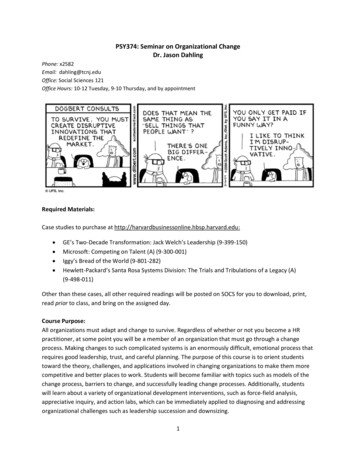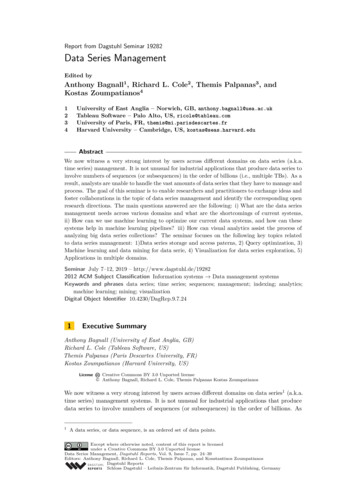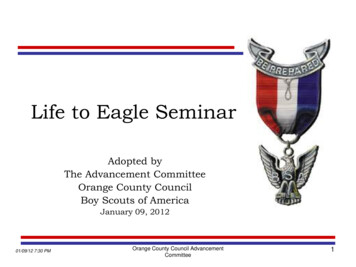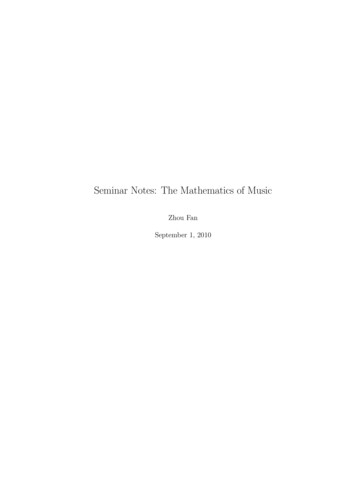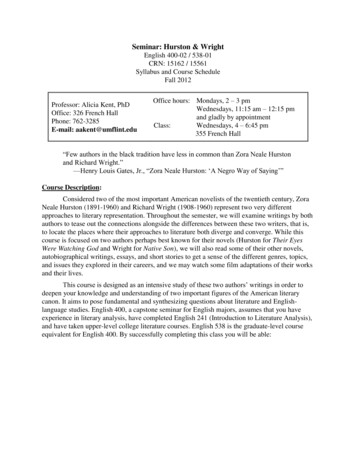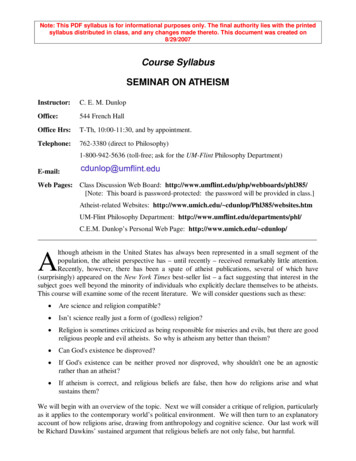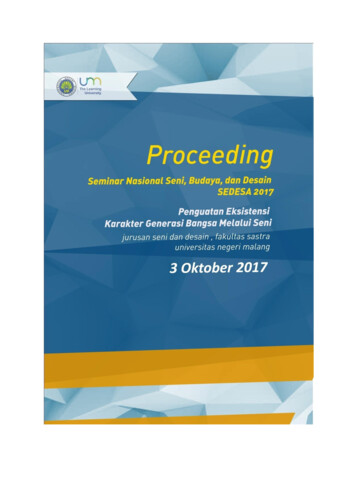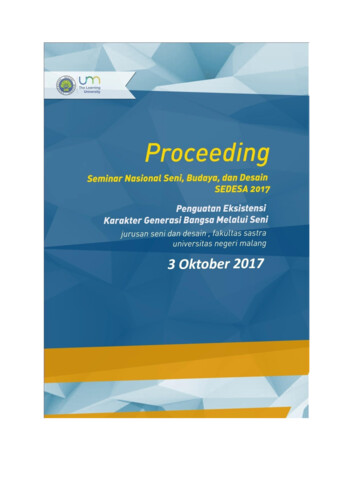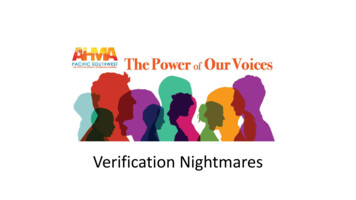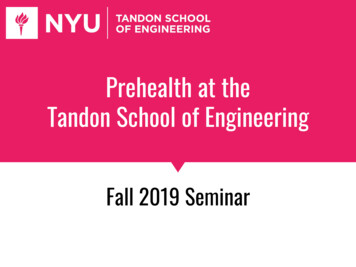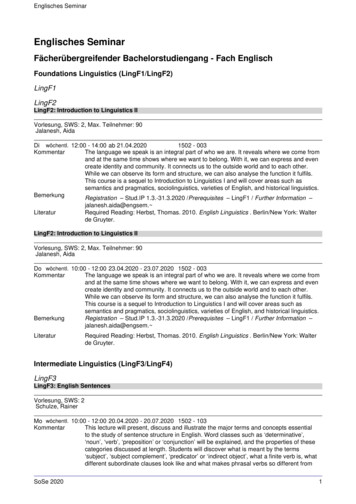
Transcription
Englisches SeminarEnglisches SeminarFächerübergreifender Bachelorstudiengang - Fach EnglischFoundations Linguistics (LingF1/LingF2)LingF1LingF2LingF2: Introduction to Linguistics IIVorlesung, SWS: 2, Max. Teilnehmer: 90Jalanesh, AidaDi wöchentl. 12:00 - 14:00 ab 21.04.20201502 - 003KommentarThe language we speak is an integral part of who we are. It reveals where we come fromand at the same time shows where we want to belong. With it, we can express and evencreate identity and community. It connects us to the outside world and to each other.While we can observe its form and structure, we can also analyse the function it fulfils.This course is a sequel to Introduction to Linguistics I and will cover areas such assemantics and pragmatics, sociolinguistics, varieties of English, and historical linguistics.BemerkungRegistration – Stud.IP 1.3.-31.3.2020 /Prerequisites – LingF1 / Further Information –jalanesh.aida@engsem. LiteraturRequired Reading: Herbst, Thomas. 2010. English Linguistics . Berlin/New York: Walterde Gruyter.LingF2: Introduction to Linguistics IIVorlesung, SWS: 2, Max. Teilnehmer: 90Jalanesh, AidaDo wöchentl. 10:00 - 12:00 23.04.2020 - 23.07.2020 1502 - 003KommentarThe language we speak is an integral part of who we are. It reveals where we come fromand at the same time shows where we want to belong. With it, we can express and evencreate identity and community. It connects us to the outside world and to each other.While we can observe its form and structure, we can also analyse the function it fulfils.This course is a sequel to Introduction to Linguistics I and will cover areas such assemantics and pragmatics, sociolinguistics, varieties of English, and historical linguistics.BemerkungRegistration – Stud.IP 1.3.-31.3.2020 /Prerequisites – LingF1 / Further Information –jalanesh.aida@engsem. LiteraturRequired Reading: Herbst, Thomas. 2010. English Linguistics . Berlin/New York: Walterde Gruyter.Intermediate Linguistics (LingF3/LingF4)LingF3LingF3: English SentencesVorlesung, SWS: 2Schulze, RainerMo wöchentl. 10:00 - 12:00 20.04.2020 - 20.07.2020 1502 - 103KommentarThis lecture will present, discuss and illustrate the major terms and concepts essentialto the study of sentence structure in English. Word classes such as ‘determinative’,‘noun’, ‘verb’, ‘preposition’ or ‘conjunction’ will be explained, and the properties of thesecategories discussed at length. Students will discover what is meant by the terms‘subject’, ‘subject complement’, ‘predicator’ or ‘indirect object’, what a finite verb is, whatdifferent subordinate clauses look like and what makes phrasal verbs so different fromSoSe 20201
Englisches SeminarBemerkungLiteraturprepositional verbs. Concepts such as ‘constituency’, ‘movement’, ‘subcategorisation’,‘selectional restrictions’ or ‘thematic roles’ will be introduced and exemplified, withextensive illustrations from English (and sometimes other languages).Registration – Stud.IP 01.03.2020-31.03.2020 / Prerequisites – LingF1-LingF2 / Furtherinformation –rainer.schulze@engsem. Recommended readings:5Aarts, Bas. 2018. English Syntax and Argumentation. Basingstoke: Palgrave Macmillan.Kreyer, Rolf. 2010. Introduction to English Syntax. Frankfurt/Main usw.: Peter LangVerlag.5Tallerman, Maggie. 2019. Understanding Syntax. London and New York: Routledge.LingF4LingF4: English DialectologySeminar, SWS: 2Altendorf, UlrikeMi wöchentl. 10:00 - 12:00 15.04.2020 - 22.07.2020 1502 - 703KommentarThis course will explore classic, recent and current studies in English Dialectology witha focus on varieties of English in England. The course requires a solid knowledge ofphonetics and phonology!BemerkungLiteraturRegistration – Stud.IP 1.3.-31.3.2020 /Prerequisites – LingF1-LingF2-LingF3 (ifapplicable) / Further Information –ulrike.altendorf@engsem Arthur Hughes, Peter Trudgill and Dominic Watt (52012 [11979]). English Accents andDialects: An Introduction to Social and Regional Varieties of English in the British Isles .Hodder.Basic Linguistics (LingF1/LingF2/LingF4) (Zweitfach)LingF1LingF2LingA2: Linguistic Typology (for FüBa and DEL students)Seminar, SWS: 2, Max. Teilnehmer: 40Czicza, DánielDi wöchentl. 12:00 - 14:00 14.04.2020 - 21.07.2020 1502 - 703KommentarLanguage typology (or linguistic typology) classifies languages according to theirstructural properties dividing them into different types. It basically studies two mainquestions: a) What do languages have in common / What are linguistic universals?, andb) What are the ways in which languages differ from each other? First, the course willgive a short introduction to the main fields of research on language types and to linguisticuniversals. Second, the main focus will be on morphological and syntactic typology. Wewill be dealing with issues such as inflection (e.g. analytic, agglutinative, flective etc.),word order (e.g. subject-object-verb or verb-subject-object) and operational dimensions(e.g. possession). As for our analysis, we will mainly use linguistic structures from threelanguages: English, German and Hungarian.This course is open to undergraduate (FüBA) students and students of the LinguisticsMaster Programme (DEL). MEd students are to choose among the advanced coursesoffered by Prof. Schulze and Prof. Altendorf.SoSe 20202
Englisches SeminarBemerkungLiteraturRegistration – Stud.IP 01.03.2020-31.03.2020 / Further information –daniel.czicza@engsem. ReferencesAikhenvald, Alexandra Y. / Dixon, Robert M. W. (eds.) (2017): The Cambridge handbookof linguistic typology. Cambridge: Cambridge University Press.Biber, Douglas et al. (1999): Longman grammar of spoken and written English. London:Langenscheidt / Longman.Croft, William (2003): Typology and universals. Second ed. Cambridge: CambridgeUniversity Press.Deutscher, Guy (2011): Through the language glass. Why the world looks different inother languages. London: Arrow books.Dixon, Robert M. W. (2016): Are some languages better than others? Oxford / New York:Oxford University Press.thDurrell, Martin (2011): Hammer s German grammar and usage. 5 ed. London / NewYork: Routledge.Gunkel, Lutz / Murelli, Adriano / Schlotthauer, Susan / Wiese, Bernd / Zifonun, Gisela(2017): Grammatik des Deutschen im europäischen Vergleich : das Nominal. Berlin /Boston: de Gruyter.Hawkins, John (1986): A Comparative Typology of English and German. Unifying theContrasts. London: Croom Helm.Huddleston, Rodney / Pullum, Geoffrey K. (2002): The Cambridge Grammar of theEnglish Language. Cambridge: Cambridge University Press.Whaley, Lindsay J. (1997): Introduction to typology. The unity and diversity of language.Thousand Oaks / London / New Delhi: Sage.Zifonun, Gisela (2001): Grammatik des Deutschen im europäischen Vergleich: DasPronomen. Teil I: Überblick und Personalpronomen. Mannheim: IDS.LingF2: Introduction to Linguistics IIVorlesung, SWS: 2, Max. Teilnehmer: 90Jalanesh, AidaDi wöchentl. 12:00 - 14:00 ab 21.04.20201502 - 003KommentarThe language we speak is an integral part of who we are. It reveals where we come fromand at the same time shows where we want to belong. With it, we can express and evencreate identity and community. It connects us to the outside world and to each other.While we can observe its form and structure, we can also analyse the function it fulfils.This course is a sequel to Introduction to Linguistics I and will cover areas such assemantics and pragmatics, sociolinguistics, varieties of English, and historical linguistics.BemerkungRegistration – Stud.IP 1.3.-31.3.2020 /Prerequisites – LingF1 / Further Information –Literaturjalanesh.aida@engsem. Required Reading: Herbst, Thomas. 2010. English Linguistics . Berlin/New York: Walterde Gruyter.LingF2: Introduction to Linguistics IIVorlesung, SWS: 2, Max. Teilnehmer: 90Jalanesh, AidaDo wöchentl. 10:00 - 12:00 23.04.2020 - 23.07.2020 1502 - 003KommentarThe language we speak is an integral part of who we are. It reveals where we come fromand at the same time shows where we want to belong. With it, we can express and evenSoSe 20203
Englisches SeminarBemerkungLiteraturcreate identity and community. It connects us to the outside world and to each other.While we can observe its form and structure, we can also analyse the function it fulfils.This course is a sequel to Introduction to Linguistics I and will cover areas such assemantics and pragmatics, sociolinguistics, varieties of English, and historical linguistics.Registration – Stud.IP 1.3.-31.3.2020 /Prerequisites – LingF1 / Further Information –jalanesh.aida@engsem. Required Reading: Herbst, Thomas. 2010. English Linguistics . Berlin/New York: Walterde Gruyter.LingF4LingF4: English DialectologySeminar, SWS: 2Altendorf, UlrikeMi wöchentl. 10:00 - 12:00 15.04.2020 - 22.07.2020 1502 - 703KommentarThis course will explore classic, recent and current studies in English Dialectology witha focus on varieties of English in England. The course requires a solid knowledge ofphonetics and phonology!BemerkungLiteraturRegistration – Stud.IP 1.3.-31.3.2020 /Prerequisites – LingF1-LingF2-LingF3 (ifapplicable) / Further Information –ulrike.altendorf@engsem Arthur Hughes, Peter Trudgill and Dominic Watt (52012 [11979]). English Accents andDialects: An Introduction to Social and Regional Varieties of English in the British Isles .Hodder.Advanced Linguistics (LingA1/LingA2)LingA1Deutsch und Englisch im Vergleich und im Kontrast – English and German in Comparison andContrastSeminar, SWS: 2Diewald, Gabriele Schulze, RainerDi wöchentl. 10:00 - 12:00 14.04.2020 - 25.07.2020 1502 - 615KommentarThis advanced seminar aims to give an overview of the most important structuraldifferences between English and German. It will reconsider some issues alreadydiscussed in earlier introductory classes (e.g. Introduction to Linguistics ), albeit froma decidedly different point of view. We will explore how the basic structural differencesbetween English and German are related to each other. The focus of this seminar willtherefore be on clusters or bundles of contrast, each of which can be derived from afundamental structural difference between the two languages. The overarching objective,then, will be to show how it is possible to bring order to the large variety of superficiallyunrelated contrasts between English and German which, after all, are two otherwiseclosely related languages. Thus, we will take a bird’s-eye view of the two languages: thetask will be to work out their most essential characteristics and trace back our findingsconcerning what they have and have not in common to general tendencies amongthe world’s languages. One crucial insight is going to be that many of the differencesbetween English and German are not restricted to these two languages, but representmore general contrasts between languages which – like English and German – representdifferent language types. Along these lines, we will have to restrict ourselves to a fewselect phonetic and phonological, morphological, grammatical, syntactic, pragmaticand/or semantic issues: agreement, analytic, blending of constructions, case system,(pseudo-) cleft, final devoicing, focus particle, fused constructions, gerund, grammaticalrelation, grammaticalisation, interference types (substitution, ), loose-fit language, markedness, modal particle, passiveconstruction, predicate-argument structure, preposition stranding, raising construction,SoSe 20204
Englisches SeminarBemerkungLiteratursemantic roles of subjects and objects, synthetic, theme and rheme, tight-fit language,transfer, transitive construction, transparency, verb-phrase contrasts, word order, andword stress.Teilnehmerzahl: 50Literatur e – recommended reading:4König, Ekkehard and Volker Gast. 2018. Understanding English-German Contrasts .Berlin: Erich Schmidt Verlag.An additional reader will be made available at the beginning of the semester.LingA1: Construction GrammarSeminar, SWS: 2, Max. Teilnehmer: 40Czicza, DánielMi wöchentl. 14:00 - 16:00 15.04.2020 - 22.07.2020 1502 - 703KommentarConstruction grammar is a framework to analyze linguistic knowledge. It deals with thequestion, what speakers have to know to produce and to understand different utterancesof a given language. The basic idea of construction grammar is to apply the Saussureannotion of linguistic signs as conventional pairings of form and meaning not only to wordsbut to all levels of grammatical description, that is to derivational morphemes (e.g. buyer ,seller ), idioms (such as to kick the bucket ) and sentence patterns (e.g. resultative Shewiped the table clean ). The course has the following purposes: a) introducing participantsto basic issues and methods in the study of constructions, b) guiding them throughdifferent levels of grammatical description of constructions (i.e. syntax, morphology), andc) helping them identify and analyze constructions in a systematic way.BemerkungLiteraturThis course is open to undergraduate (FüBA) students and students of the LinguisticsMaster Programme (DEL). MEd students are to choose among the advanced coursesoffered by Prof. Schulze and Prof. Altendorf.Registration – Stud.IP 01.03.2020-31.03.2020 / Further information –daniel.czicza@engsem. ReferencesCroft, William (2001): Radical construction grammar. Syntactic theory in typologicalperspective. Oxford: Oxford University Press.Croft, William / Cruse, Alan (2004): Cognitive linguistics. Cambridge: CambridgeUniversity Press.Evans, Vyvyan / Green, Melanie (2006): Cognitive linguistics: an introduction. Edinburgh:Edinburgh University Press.Fillmore, Charles / Kay, Paul / O Connor, Mary C. (1988): Regularity and idiomacity ingrammatical constructions: The case of let alone . In: Language 64, 501-538.Goldberg, Adele E. (1995): Constructions: a construction grammar approach to argumentstructure. Chicago: University of Chicago Press.Hilpert, Martin (2014): Construction grammar and ist application to English. Edinburgh:Edinburgh University Pres
Durrell, Martin (2011): Hammer s German grammar and usage. 5 th ed. London / New York: Routledge. Gunkel, Lutz / Murelli, Adriano / Schlotthauer, Susan / Wiese, Bernd / Zifonun, Gisela (2017): Grammatik des Deutschen im europäischen Vergleich : das Nominal. Berlin / Boston: de Gruyter. Hawkins, John (1986): A Comparative Typology of English and German. Unifying the Contrasts. London: Croom .
